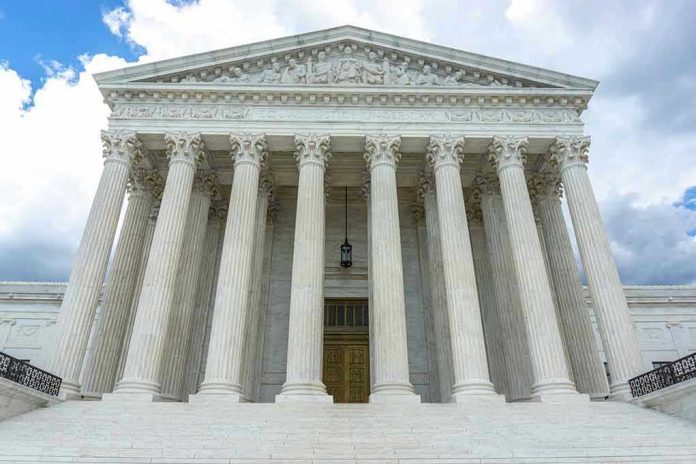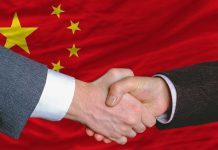
When the nation’s most scandalous sex trafficking case finally slammed to a close with the Supreme Court’s silent refusal to intervene, Ghislaine Maxwell’s fate—and the fate of public trust in elite accountability—was sealed in a single, unceremonious line.
Quick Take
- The Supreme Court’s denial of Maxwell’s appeal cements her 20-year conviction with finality.
- Maxwell’s legal odyssey spotlights the rare prosecution of powerbrokers for sex crimes.
- The courtroom battle exposes enduring tensions between justice for victims and due process for notorious defendants.
- The outcome reverberates beyond Maxwell, raising the bar for future sex trafficking accountability.
The Final Gavel: Supreme Court Ends Maxwell’s Legal Battle
The Supreme Court’s rejection of Ghislaine Maxwell’s last-ditch appeal closed the book on one of the most scrutinized criminal sagas in recent American memory. Maxwell, once a fixture in the world’s most exclusive social circles, now serves a 20-year sentence with no further legal escape routes. The Court’s decision, issued without comment, delivered neither drama nor explanation—just the cold efficiency of final justice in a case that had already consumed years of legal and public attention.
Maxwell’s defeat before the high court marks the conclusive end to a legal journey that began when Jeffrey Epstein’s empire of abuse was first exposed. Her conviction on five federal counts, including sex trafficking of a minor, survived every appellate test, from the Southern District of New York up through the U.S. Court of Appeals for the Second Circuit. By the time her attorneys filed the final petition for Supreme Court review, the odds were already stacked against her. Fewer than 2% of such petitions are granted, and the Court’s refusal signals not just legal exhaustion, but institutional resolve to let this verdict stand.
How the Maxwell Case Redefined Accountability for the Powerful
The Maxwell case transcends individual guilt and punishment; it stands as a rare example where power, privilege, and connections offered no shelter from criminal prosecution. For decades, the Epstein network operated in the shadows, shielded by money and influence. Maxwell’s arrest in July 2020, after months in hiding, shattered the illusion that those nearest to the powerful could operate with impunity. The trial’s vivid testimony from survivors—women exploited as minors—dragged decades-old wounds into the public record, holding not just the main perpetrator, but his key enabler, to account.
Maxwell’s social status, once her greatest asset, became a focal point for outrage. Prosecutors and victim advocates alike argued that her conviction would set a precedent for going after facilitators, not just abusers. That legal principle—expanding liability to those who enable and profit from sexual exploitation—now stands reinforced, emboldening prosecutors and survivors in future high-profile cases. The message is clear: association with power does not guarantee immunity.
The Legal Labyrinth: Due Process and High-Profile Justice
Maxwell’s legal team, led by David Oscar Markus, argued that intense media scrutiny and public outrage made a fair trial impossible. Amicus briefs filed by national defense organizations echoed concerns about prejudicial coverage and jury impartiality. Yet, federal courts found no reversible error, and the Supreme Court’s denial signals institutional confidence in the lower court process. For legal observers, the case underscores the challenge of balancing defendants’ rights with public demands for accountability, especially when the stakes are amplified by celebrity and scandal.
For many, the case’s legal finality offers overdue validation for survivors, whose testimonies were often doubted or dismissed before the #MeToo era. For others, it highlights the relentless pressure on courts to withstand media storms without sacrificing basic fairness. The legal community, meanwhile, will debate whether this balance was struck perfectly—or whether the intense spotlight forever altered the calculus of justice in notorious cases.
Aftershocks and Lessons for American Justice
The ripples of Maxwell’s conviction stretch far beyond a single defendant. Institutions linked to Epstein now face renewed scrutiny, and advocacy groups press for reforms in how the justice system handles sex trafficking and victim protection. The outcome emboldens survivors to come forward and encourages prosecutors to pursue cases against enablers, not just direct offenders. The legal industry, meanwhile, analyzes every step for clues about how to conduct high-profile trials in the modern era of relentless media immersion.
Maxwell remains incarcerated, her legal journey at an absolute dead end. But the story’s true ending may lie in the precedents it sets: that the law can reach the powerful, that victims’ voices can be heard, and that justice—though slow and imperfect—remains possible, even in the shadow of privilege. The Supreme Court’s silent verdict may have been brief, but the consequences will echo across American courts and headlines for years to come.
Sources:
Supreme Court of the United States, Docket for Ghislaine Maxwell v. United States, No. 24-1073










